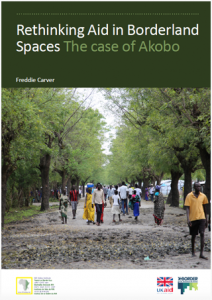Taking the Ethiopia-South Sudan borderlands as a case study, Rethinking Aid in Borderland Spaces: The case of Akobo argues that the traditional modalities of the aid industry are not fit for purpose in a world where transnationalism is a daily reality for communities, even—perhaps even especially—in the most geographically remote locations. The transnational networks that shape much of daily life operate outside of the control of state actors, and understanding and engaging with them therefore requires an approach that does not rely exclusively on the state system. The report argues for an increase in research and focus on these networks to better inform aid interventions, part of the need for which is being addressed through the X-Border Local Research Network.
This report is a product of the X-Border Local Research Network, a component of DFID’s Cross- Border Conflict—Evidence, Policy and Trends (XCEPT) programme, funded by UKaid from the UK government. The programme carries out research work to better understand the causes and impacts of conflict in border areas and their international dimensions. It supports more effective policymaking and development programming and builds the skills of local partners. This briefing was written by Edward Thomas and Magdi El Gizouli.




